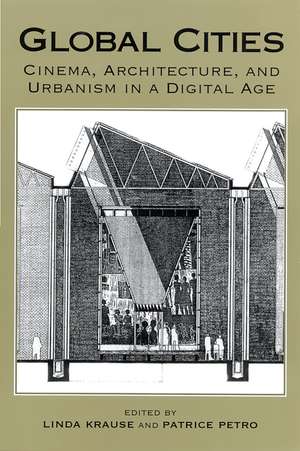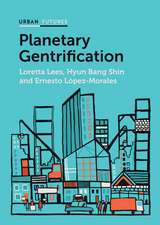Global Cities: Cinema, Architecture, and Urbanism in a Digital Age: New Directions in International Studies
Editat de Patrice Petro, Linda Krauseen Limba Engleză Paperback – 2 iul 2003
In Global Cities, scholars from an impressive array of disciplines critique the growing body of literature on the process broadly known as "globalization." This interdisciplinary focus enables the authors to explore the complex geographies of modern cities, and offer possible strategies for reclaiming a sense of place and community in these globalized urban settings. While examining major cities including New York, Tokyo, Berlin, Paris, and Hong Kong, contributors insist that the study of urban experiences must remain as attentive to the material effects as to the psychic and social consequences of globalization. Accordingly, essays explore the implications of global culture for architecture, cinema, and communication--but do so in a way that highlights the importance of the spaces between such metropolitan centers. These locations, the authors argue, serve as increasingly important "frontier zones," where a diverse set of actors converge and contend for power and presence. Such a perspective ultimately adds nuance and meaning to our understanding of the heterogeneous urban landscapes of these global cities. Linda Krause is an associate professor in the Department of Architecture at the School of Architecture and Urban Planning, University of Wisconsin, Milwaukee. Patrice Petro is professor of film studies and director of the Center for International Education at the University of Wisconsin, Milwaukee. A volume in the New Directions in International Studies series, edited by Patrice Petro
Preț: 288.69 lei
Nou
Puncte Express: 433
Preț estimativ în valută:
55.24€ • 57.83$ • 45.71£
55.24€ • 57.83$ • 45.71£
Carte tipărită la comandă
Livrare economică 07-21 aprilie
Preluare comenzi: 021 569.72.76
Specificații
ISBN-13: 9780813532769
ISBN-10: 0813532760
Pagini: 224
Ilustrații: 1
Dimensiuni: 152 x 229 x 15 mm
Greutate: 0.37 kg
Ediția:None
Editura: Rutgers University Press
Colecția Rutgers University Press
Seria New Directions in International Studies
ISBN-10: 0813532760
Pagini: 224
Ilustrații: 1
Dimensiuni: 152 x 229 x 15 mm
Greutate: 0.37 kg
Ediția:None
Editura: Rutgers University Press
Colecția Rutgers University Press
Seria New Directions in International Studies
Notă biografică
Linda Krause is an associate professor in the Department of Architecture at the School of Architecture and Urban Planning, University of Wisconsin, Milwaukee.
Patrice Petro is professor of film studies and director of the Center for International Education at the University of Wisconsin, Milwaukee.
Patrice Petro is professor of film studies and director of the Center for International Education at the University of Wisconsin, Milwaukee.
Cuprins
Reading the city in a global digital age: between topographic representation and spatialized power projects / Saskia Sassen
Collective memory and locality in global cities / Jennifer Jordan
Gobbled up and gone: cultural preservation and the global city marketplace / Tasha G. Oren
Los toquis, or urban babel / Nataša Ďurovičová
Too close to home: Naruse Mikio and Japanese cinema of the 1950s / Catherine Russell
Authenticity and globalization / John B. Hertz
Global cannibal city machines: recent visions of urban/social space / Peter Sands
Cinema, the city, and the cinematic / Ackbar Abbas
Codes, collectives, and commodities: rethinking global cities as metalogistical spaces / Timothy W. Luke
Some thoughts on cities: visions and plans / Jorge Annibal-Iribarne
Architecture and memory / Jo Noero
Collective memory and locality in global cities / Jennifer Jordan
Gobbled up and gone: cultural preservation and the global city marketplace / Tasha G. Oren
Los toquis, or urban babel / Nataša Ďurovičová
Too close to home: Naruse Mikio and Japanese cinema of the 1950s / Catherine Russell
Authenticity and globalization / John B. Hertz
Global cannibal city machines: recent visions of urban/social space / Peter Sands
Cinema, the city, and the cinematic / Ackbar Abbas
Codes, collectives, and commodities: rethinking global cities as metalogistical spaces / Timothy W. Luke
Some thoughts on cities: visions and plans / Jorge Annibal-Iribarne
Architecture and memory / Jo Noero
Recenzii
Racing across the disciplines of architecture, sociology, media studies, and cultural studies, and sites like Berlin, Tokyo, and San Diego, this collection is unique in its ecumenical approach to the new phenomenon of the city under or as globalization.
Descriere
In Global Cities, scholars from an impressive array of disciplines critique the growing body of literature on the process broadly known as "globalization." This interdisciplinary focus enables the authors to explore the complex geographies of modern cities, and offer possible strategies for reclaiming a sense of place and community in these globalized urban settings. While examining major cities including New York, Tokyo, Berlin, Paris, and Hong Kong, contributors insist that the study of urban experiences must remain as attentive to the material effects as to the psychic and social consequences of globalization.























